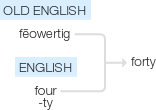Forty
Old English fēowertig (see four, -ty2).
wiktionary
From Middle English fourti, feortiȝ, from Old English fēowertiġ, ultimately from Proto-Germanic *fedwōr tigiwiz(“forty”).
etymonline
forty (adj., n.)
"1 more than thirty-nine, twice twenty; the number which is one more than thirty-nine; a symbol representing this number;" early 12c., feowerti, from Old English feowertig, Northumbrian feuortig "forty," from feower "four" (from PIE root *kwetwer- "four") + tig "group of ten" (see -ty (1)). Compare Old Saxon fiwartig, Old Frisian fiuwertich, Dutch veertig, Old High German fiorzug, German vierzig, Old Norse fjorir tigir, Gothic fidwor tigjus.
[T]he number 40 must have been used very frequently by Mesha's scribe as a round number. It is probably often used in that way in the Bible where it is remarkably frequent, esp. in reference to periods of days or years. ... How it came to be so used is not quite certain, but it may have originated, partly at any rate, in the idea that 40 years constituted a generation or the period at the end of which a man attains maturity, an idea common, it would seem, to the Greeks, the Israelites, and the Arabs. ["The International Standard Bible Encyclopedia," James Orr, ed., Chicago, 1915]
Forty winks "short sleep" is attested from 1821; in early use associated with, and perhaps coined by, English eccentric and lifestyle reformer William Kitchiner M.D. (1775-1827). Forty-niner in U.S. history was an adventurer to California (usually from one of the eastern states) in search of fortune during the gold rush of 1849.
